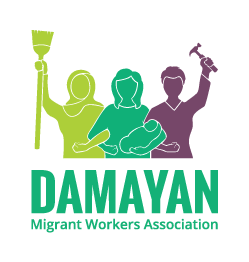Film Premiere Celebrates Tenth Year Anniversary of Baklas, Damayan’s Anti-Trafficking Campaign
NEW YORK, NY - In celebration of the tenth year anniversary of its anti-trafficking campaign, Baklas: Break Free from Labor Trafficking and Modern Day Slavery, Damayan Migrant Workers Association premiered its short film, “Sherile”, last weekend to online viewers from New York and California, among other states, as well as from the Philippines. This is the first of three short films that Damayan produced to spread awareness about the realities of labor trafficking and modern day slavery in New York City and other parts of the US. This initiative also aims to inspire labor trafficking survivors trapped in such abusive situations to speak up, escape, and seek help.
“Sherile” is a 16-minute short film detailing the story of Sherile Pahagas, a Damayan member and labor trafficking survivor, trafficked by her German diplomat employers, Pit and Mareike Koehler. She, together with Damayan, filed a humanitarian visa (T-visa) which she has won. In 2017, she and Edith Mendoza, a Damayan member and Filipina domestic worker also trafficked by the Koehlers, filed a stolen wage case. Under the iron-clad protection of diplomatic immunity, an international law codified in the Vienna Convention on Diplomatic Relations, Sherile and Edith’s case was dismissed. Sherile wasn’t able to claim any of the $212,000 stolen wages that was owed to her.
“Ako po ay naghahanap ng hustisya dahil…dinismiss ang kaso namin. Naglakas ako ng loob na magsalita…in-encourage ko ang mga kababayan natin, mga domestic worker… na inaabuso na takot lumabas, nandito po ang Damayan na tumulong sa atin. (I am seeking justice…because my case was dismissed. I gathered my nerve to speak out…to encourage my fellow Filipino domestic worker…who are being abused and are afraid, Damayan is here to help us.),” Sherile said.
After the film, Damayan co-founder and executive director Linda Oalican presented an overview of the “push and pull” factors that directly propel Filipino migrant workers into trafficking situations, as well as the root causes of this problem.
“Capitalism… has institutionalized this system of exploitation. Although we are essential, they do not give us work visas. If they give us visas, A3 or G5 for example, they make sure that these visas are controlled by employers. That if we leave our abusive traffickers / employers, we will lose our legal stay in America,” Oalican stressed.
In doing this film, activist filmmaker Michael Bonifacio shares his insights, “As a Filipino filmmaker, what I’ve learned about Sherile and Filipino domestic workers is that the power imbalance between worker and employer is rooted in greed. That modern day slavery is a by-product of capitalism… Hearing their inspiring stories of resilience gave me new insights of the human spirit. The lengths of what people would endure for the people they love. This kind of sacrificial love is the very cure for greed that causes the problem.”
Damayan, as it continues to amplify Baklas and its mission of spreading awareness and helping more trafficked workers, calls on its members, supporters, and the Philippine and US governments to fight alongside them. Baklas is a multi-fold campaign that aims to help survivors break free, win a humanitarian visa to allow them to work without fear or retribution, retrieve stolen wages, and address labor trafficking and modern day slavery at its core.
Two other films will be shown this year as part of the Baklas Stories. Both will show the different facets of labor trafficking and modern day slavery that are happening in overwhelming numbers in New York and other parts of the US.
The film can be viewed on Damayan’s YouTube: https://www.youtube.com/watch?v=dDC0yDuFP9A

